 Petzlover
Petzlover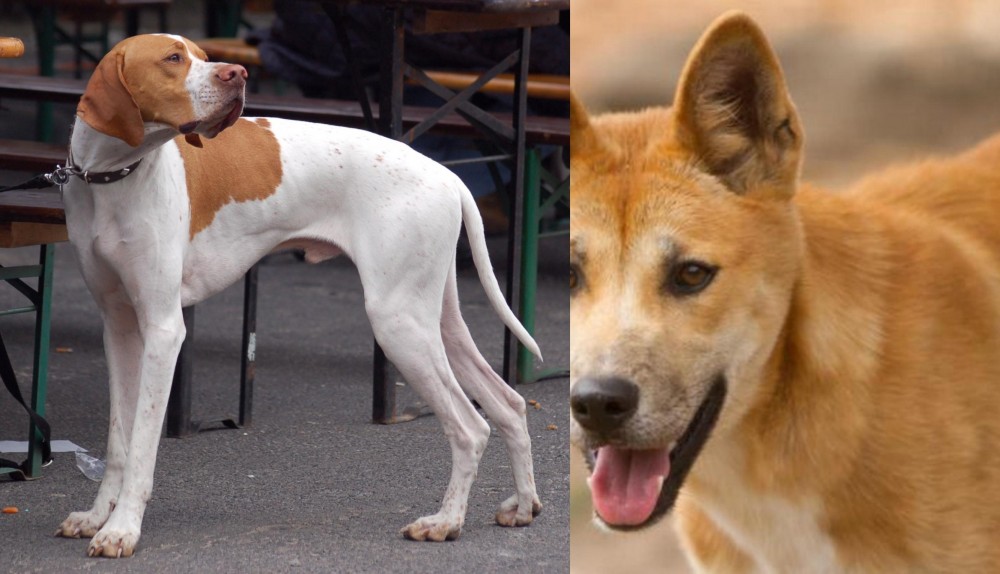 English Pointer is originated from United Kingdom but Dingo is originated from Australia. English Pointer may grow 10 cm / 4 inches higher than Dingo. Both English Pointer and Dingo are having almost same weight. English Pointer may live 6 years less than Dingo. Both English Pointer and Dingo has almost same litter size. English Pointer requires Low Maintenance. But Dingo requires Moderate Maintenance
English Pointer is originated from United Kingdom but Dingo is originated from Australia. English Pointer may grow 10 cm / 4 inches higher than Dingo. Both English Pointer and Dingo are having almost same weight. English Pointer may live 6 years less than Dingo. Both English Pointer and Dingo has almost same litter size. English Pointer requires Low Maintenance. But Dingo requires Moderate Maintenance
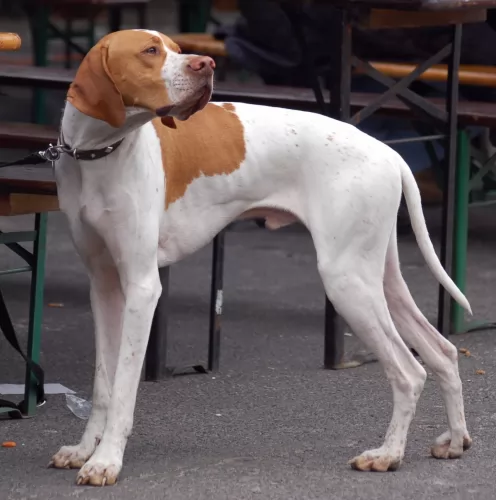 We can find records for pointers from 17th century. Breeds such as Old Spanish and Portuguese Pointer were set in to England from European Mainland. In 1800s they were brought to America and then they slowly developed their hunting skills and in 1910 they became an excellent bird hunter. In 1936 Modern American Kennel was established and they bred pointers in large quantities. They are very popular in southern United States and are called as "bird dog". Pointers are good in hunting birds like pheasant and grouse. They got their name because of their special skills in hunting.
We can find records for pointers from 17th century. Breeds such as Old Spanish and Portuguese Pointer were set in to England from European Mainland. In 1800s they were brought to America and then they slowly developed their hunting skills and in 1910 they became an excellent bird hunter. In 1936 Modern American Kennel was established and they bred pointers in large quantities. They are very popular in southern United States and are called as "bird dog". Pointers are good in hunting birds like pheasant and grouse. They got their name because of their special skills in hunting.
 The Dingo dog was in all probability, introduced to Australia thousands of years ago. He isn’t your usual domesticated dog and in fact it is a feral dog native to Australia.There are stories that suggest that while they may have once been pets, they were abandoned so that they reverted back to their wild state.
The Dingo dog was in all probability, introduced to Australia thousands of years ago. He isn’t your usual domesticated dog and in fact it is a feral dog native to Australia.There are stories that suggest that while they may have once been pets, they were abandoned so that they reverted back to their wild state.
They became pests for Australian farmers, going for their livestock, and huge fences were erected. The different climates in Australia have meant different kinds of Dingo developing, so while the desert ones are like the desert sands - golden yellow to red the alpine ones are rarer and are cream colored.
These wild canines were also introduced to Southeast Asia some 3,500 years ago, however the dog’s exact origin is debatable. There are any number of groups of people who could have brought the dingo to Australia, and among some of these are Indian mariners or maritime hunters.
The dog has been found in many parts of mainland Australia but never became established in Tasmania.There has also been an effort to remove the Dingo from farming areas. It is interesting to note that the first Dingo, referred to as the Australian dog, was registered at the London Zoo in 1828.
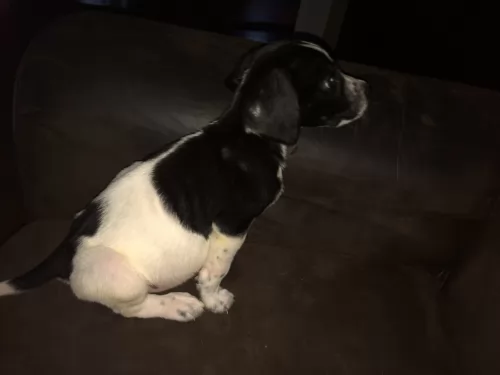 Pointer has a long head and its body is perfectly suitable for hunting. In hunting the pointers shows hunter the direction of the bird and also they will go and get them after they were shot. They are well known for their speed, energy and continuous working. Pointers are also a good companion dog and love the family members so much. It is very easy to groom them as they have short coat. They are very alert and excellent watch dog.
Pointer has a long head and its body is perfectly suitable for hunting. In hunting the pointers shows hunter the direction of the bird and also they will go and get them after they were shot. They are well known for their speed, energy and continuous working. Pointers are also a good companion dog and love the family members so much. It is very easy to groom them as they have short coat. They are very alert and excellent watch dog.
If pointer is not set in huntng then they should be given lots of exercise daily. Pointers love to play and run with children. They will give a good company for cyclists. Pointers show their talents in dog shows especially in obedience and field trials. They will not worry about the crowd surrounding them and performs well. In performing at public, pointer will show perfect attention to its master. Pointer must be trained slowly from its puppyhood to get good results.
 An interesting fact with these fascinating feral dogs, is that like humans, they’ve got rotating wrists. This characteristic of theirs allows them to use their paws much like the human hand to catch their prey. A domesticated Dingo can therefore learn how to open doors.
An interesting fact with these fascinating feral dogs, is that like humans, they’ve got rotating wrists. This characteristic of theirs allows them to use their paws much like the human hand to catch their prey. A domesticated Dingo can therefore learn how to open doors.
The Dingo is a medium sized dog standing at roughly 52 – 60cm in height, measuring up to 1.2 meters in length and weighing roughly between 23 to 32kg.
He has long canine teeth, a long muzzle, upright ears and a long, thick tail. The coat is essentially one color, sandy, white, cream, tan or black and sometimes there are white markings on the chest, the paws and around the muzzle.
The fur is typically shortish and thick — though the hair's thickness and length will depend on the climate of the area. The Dingo is a moderate shedder and a good brushing of the coat twice a week will keep the thick coat shiny and healthy.
These wild canines are social animals, and in the wild they live in packs. There are some that opt to live on their own.
They’e territorial, but they are able to share their living space with humans. They’re generally shy around humans, but a Dingo that is trained and socialized can get along well with children and pets in the home.
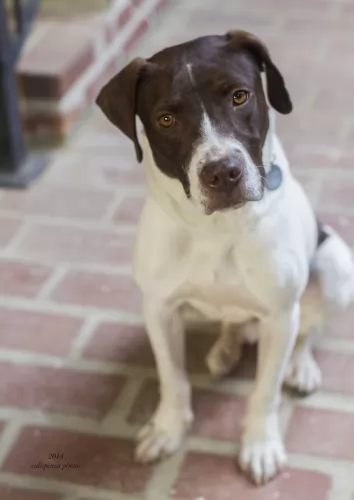 Pointer is a wonderful kid friendly dog and a nice companion. Also he is very energetic,fun-loving and an excellent watchdog. Pointers are very courageous as well as obedient. They can work for a very long time. Early socialization will make them with a good behaviour.
Pointer is a wonderful kid friendly dog and a nice companion. Also he is very energetic,fun-loving and an excellent watchdog. Pointers are very courageous as well as obedient. They can work for a very long time. Early socialization will make them with a good behaviour.
They will be happy if they are given a fenced yard to play and spend their natural energy. They will not have a good behaviour in apartment living. Pointers always likes to be with some one in his family. They are suitable for areas having hot weather and they will not do better in cold weather.
Pointers have very high intelligence and thus they are very easy to train. Good behaviours must be taught to them and the main word they must learn is "NO". They should stop what they are doing when they hear the word "NO" from you. "Sit" is another important word they should learn. Training should be given friendly and not compelling them to do it. Giving reward to them will make them happy and give more interest in training.
 Dingoes have been domesticated successfully. Some people swear by them as making a fantastic pet. However, they’re wild dogs and can be unpredictable.
Dingoes have been domesticated successfully. Some people swear by them as making a fantastic pet. However, they’re wild dogs and can be unpredictable.
There are others who have tried to keep the Dingo as a pet but who have discarded them when they proved to be a danger in the home.
Dingoes can be trained but they’re high energy dogs and require a lot of exercise. How do you feel about owning a Dingo as a pet? Many people feel that its not fair to bring an essentially wild animal into your home. They feel that there are plenty of rescue dogs dying for a home without human beings searching in the wilds for an unusual pet, and regretting it later on.
 Pointers face health problems such as gastric torsion, hypothyroidism and canine hip dysplasia. Overweight will also lead to many health problems in them. Other problems seen in them are cardiomyopathy, ectropion and progressive retinal atrophy.
Pointers face health problems such as gastric torsion, hypothyroidism and canine hip dysplasia. Overweight will also lead to many health problems in them. Other problems seen in them are cardiomyopathy, ectropion and progressive retinal atrophy.
They have the chances to get several skin disorders which leads to hairfall. Follicular Dysplasia is a hereditary disorder which causes hairfall. Special shampoos or lotion to combat the dry skin should be used to overcome this problem.
 The Dingo is a long-lived dog and you can expect your Dingo to live till anything between 15 and 20 years.
The Dingo is a long-lived dog and you can expect your Dingo to live till anything between 15 and 20 years.
When it comes to health issues, they are robust and resilient, having less medical problems to contend with than your regular dog.
However if you see that your Dingo is not his usual robust, energetic self, get him to the vet as soon as you can.
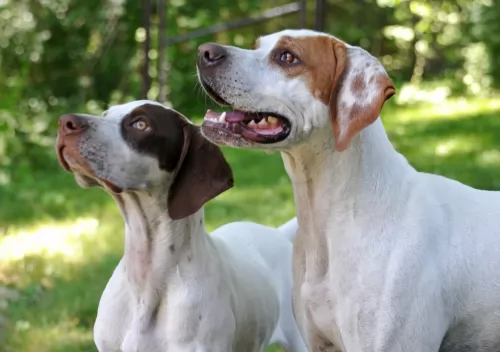 Normally puppies require more food when compared with adult to meet their growth needs. The food given to the pointer puppy must contain vitamins, carbohydrates and minerals. Also the food given to his mother should be continued to the puppy as to avoid digestive problems for the puppy. If it is needed to change the food then it should be done in a step by step process.
Normally puppies require more food when compared with adult to meet their growth needs. The food given to the pointer puppy must contain vitamins, carbohydrates and minerals. Also the food given to his mother should be continued to the puppy as to avoid digestive problems for the puppy. If it is needed to change the food then it should be done in a step by step process.
Pointer can be fed one or two times a day. Usally small meal is given in morning and full meal will be given in the evening. But in case if they will be left alone for the whole day then morning food shall be a full meal. They can be fed meat of goat, pork, fish and woodcock. Brown rice is a good food for pointer.
Pointers will be happy if they are always with their family. They enjoy when they are taken outside for playing or camping. Puppies don't need much exercise as adults need. Adults should not be fed too much as it will lead to overweight.
When pointer is given proper exercises and training they will be a very good mannered dog. They are very active and intelligent dogs and hence require exercise and training regularly. The breed was developed to be a hunting dog and can work continuously in a day. Pointers should be exercised a minimum of an hour per day. They will be happy to run along with your bicycle and playing frisbee with you.
 Caring for your Dingo will be different to caring for your usual pet dog. You have to remember the Dingo is an ancient, wild species with some unique characteristics. Having a Dingo as a pet and companion may not be an easy task, and it is why many people selfishly dump their Dingoes – they didn’t quite live up to what they had in mind.
Caring for your Dingo will be different to caring for your usual pet dog. You have to remember the Dingo is an ancient, wild species with some unique characteristics. Having a Dingo as a pet and companion may not be an easy task, and it is why many people selfishly dump their Dingoes – they didn’t quite live up to what they had in mind.
Your Dingo, just like any other dog you’d have, will require training and socialization, and the earlier the better. No training will simply mean you having an unruly pet in the home.
Your Dingo can be fed just like you would with your other dogs. You can feed him quality dog kibble as his main diet, but you can also add in cooked rice, vegetables and chicken. Your Dingo is essentially a wild dog, so you will definitely want to include some raw meat into his diet from time to time as well.
A Dingo is used to running free so he will require plenty of outdoor exercise. He can also be put on a leash and taken for a walk. He’ll love joining you in your activities such as running alongside you as you jog or cycle. He can adapt to life in the city if he is well exercised but he isn’t suited to a small home or garden.